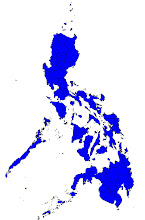from Phil. Star SKETCHES By Ana Marie Pamintuan
Long before the Senate resumed session after the Christmas break, people had already formed their opinions on the C-5 controversy that is hounding the candidacy of Sen. Manuel Villar.
What his supporters want is for the issue to go away, which it will not; the charges, and Villar’s reaction to the controversy, will be remembered all the way to Election Day.
The damage has been done to the Villar camp. What his critics and enemies want will merely be icing on the cake: an official censure, which Senate President Juan Ponce Enrile will reportedly try to swing in a last-ditch effort next week.
Even if Enrile fails, all that Villar’s rivals need to do is keep reminding voters about the controversy, and see if it will make a dent in his ratings.
Villar can only hope that negative campaigning, regardless of whether or not the accusations are true, will only go so far in this land of cynics who think politicians are all the same dogs with different collars. There are also voters who believe that a candidate either sells his virtues or, in the absence of any, tries to look good by making his rivals look bad.
It remains to be seen whether bringing down Villar will improve the sagging ratings of the standard-bearer of Enrile’s party, Joseph Estrada. The party of a convicted plunderer is not in the best position to be a champion of good governance or ethical conduct, and Enrile has a credibility problem dating back to the martial law regime of Ferdinand Marcos.
It also remains to be seen whether Erap’s sagging ratings will lead his supporters – most importantly at this stage, his financial backers – to defect to either Villar or the leading contender, Sen. Benigno “Noynoy” Aquino III. Investors do not put good money into the war chest of a potential loser. Such defections will intensify in the final, crucial weeks of the campaign, just when fund releases to local political leaders are most needed.
In the rarefied enclaves of the enormously rich in Makati, there is audible sighing and pining for a miracle that will put Gilbert Teodoro at the head of the pack. The guy comes off competent, he’s amiable enough, he’s energetic and seems to have a good work ethic, and he’s untainted by corruption scandals.
But Teodoro was warned from the start about the kiss of death of his chief endorser, even if President Arroyo tries mightily to stay away from his campaign and hole up in Lubao, Pampanga.
How can you stand for change and good government if you are seen as GMA’s best chance of getting away with everything once she is no longer in power?
Even without the kiss of death, Teodoro suffers from the same affliction that forced Sen. Mar Roxas II, a clean and competent candidate, to slide down to the vice presidential race: “Gibo” can’t connect enough with the masses, despite the nickname change, the many rounds of pressing the flesh, and even after wading into floodwaters up to his waist.
Mass appeal is Erap’s singular strength. His misfortune is that dazzling charm and star power are no longer enough for the Pinoy voter, as even boxing superstar Manny Pacquiao has learned.
* * *
If Erap’s party head Enrile fails to boost the comeback kid’s ratings by pulling down Villar, the Senate probe on C-5, which has degenerated into a political rumble, should at least lead to something positive.
There is no more time for the 14th Congress to implement reforms within the chamber. The job is left to the 15th Congress, which should remind its members of conduct that would reinforce rather than erode public respect for the legislature.
It wasn’t too long ago that statesmen like Jovito Salonga and Lorenzo Tañada walked the halls of the Senate. Surely the country still has individuals like them who deserve public esteem.
The C-5 controversy should lead to a better, more transparent system of congressional budget deliberation and utilization of the pork barrel. Sen. Joker Arroyo, an ally of Villar, has pointed out that all senators approved the C-5 budget four times.
Senators should also tighten their rules on ethics, and improve compliance. They should decide if their rules allow mere censure or require the suspension or expulsion of an erring member of the chamber.
The controversy has also highlighted the problem of conflict of interest, which has long afflicted both chambers of Congress.
When the congressional ethics rules are rewritten with the C-5 controversy in mind, there should be a clear definition of what constitutes conflict of interest.
The definition can be especially tricky in the House of Representatives, where the nature of the job allows congressmen to specifically address the needs of their constituents, including their relatives who could be the biggest property owners or investors in their congressional district.
Lawmakers routinely support legislation that directly benefit their family businesses. The same is true in the use of pork barrel allocations. No family has been immune to the use of power for personal ends.
The first Congress after the 1986 people power revolt, for example, was packed with members of the country’s biggest landowners, including relatives of then President Corazon Aquino. The landowners made sure that the agrarian reform law would not be comprehensive enough to include their vast estates in land redistribution.
Senators are elected at large, but they can use their individual votes plus their positions in the various committees to support legislation that will directly benefit themselves, relatives, friends or their home turfs.
Senators can also use their annual pork barrel, amounting to P200 million each, for similar purposes.
Can lawmakers say goodbye to all that? If they can, something truly good will result from the C-5 mess.




No comments:
Post a Comment